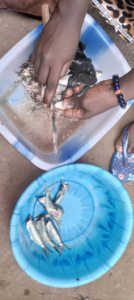By alimamy.jalloh@awokonewspaper.sl
Freetown, SIERRA LEONE – Mariatu Kamara, a resilient woman, fights an uphill battle at Rokupa Wharf to secure a bowl of mina fish, priced at Le400, a vital lifeline for her and her six children’s survival.
Standing amidst other fishmongers, Mariatu waits by the creek and landing site, hoping to purchase the elusive mina fish—a crucial commodity for her family’s sustenance. In the local dialect, Krio, they fondly call it “draw-bone,” emphasizing their reliance on raw fish sales.
As local boats arrive, carrying precious catches, Mariatu and fellow women eagerly negotiate to secure their share. Those fortunate enough to obtain the coveted fish pay Le10 to laborers for transportation to markets like Portee or others.
Though the wharf wasn’t bustling on that Saturday, Mariatu and many fishmongers, predominantly women, endure busy days. With fish scarcity, their toil becomes apparent, moving from boat to boat in hopes of procuring fish. Mariatu abstains from selling Kuta fish, focusing solely on mina.
Mariatu recounts her decades-long journey in fish sales, starting at the tender age of 10, inheriting the trade from her mother, who used to smoke fish in “Banda,” wire mesh structures.
Reflecting on the price fluctuations, Mariatu nostalgically recalls purchasing mina fish at Le20 per bowl a decade ago, underscoring that retailing fish now yields a meager Le5 profit per space.
Her current profit margins, hovering around Le50 per bowl, depend on the measurement by fishermen. Scarce availability often forces Mariatu and others to traverse various wharfs in the East of Freetown or the Western rural areas, incurring transportation costs.
“I have six children, all attending school,” Mariatu shares, expressing her struggle to provide for them. Her commitment to fish sales, passed down by her mother, led her to abandon formal education at age 10.

“This trade is my sole survival skill,” Mariatu admits, acknowledging both contentment and sadness.
Even the maintenance of fishing horsepower engines by wharf fishermen incurs additional costs, explained by a boat owner, influencing overall expenditures, including inspection fees and mechanic costs.
A laborer, transporting fish containers to the market, reveals receiving a mere Le10 per trip for his service.
Mariatu’s story encapsulates the daily strife faced by many women striving to sustain their families, highlighting the intricate web of challenges inherent in their quest for livelihood amidst scarcity and rising expenses. AJ/8/1/2024

